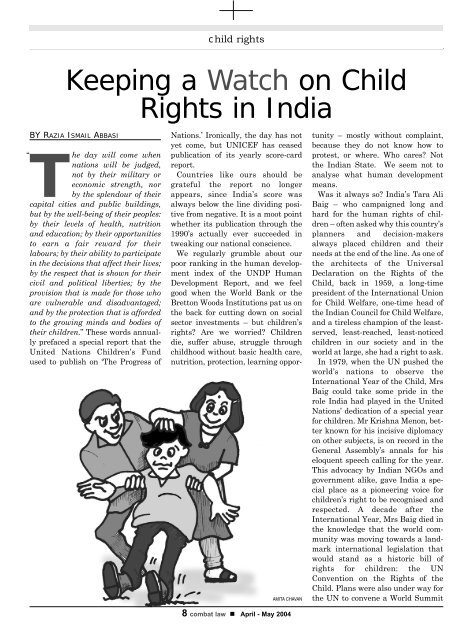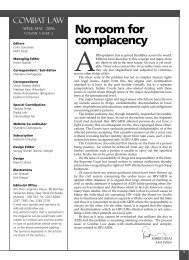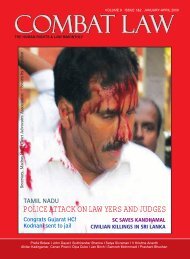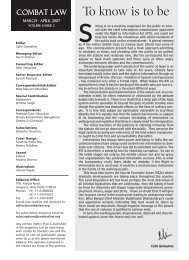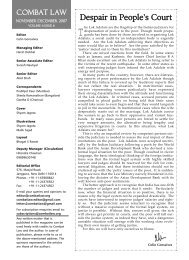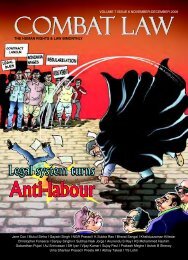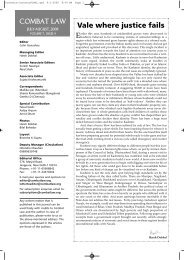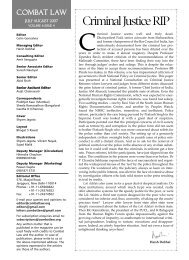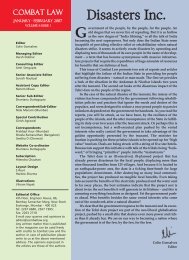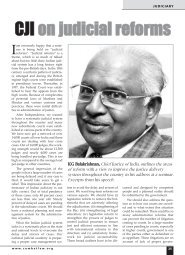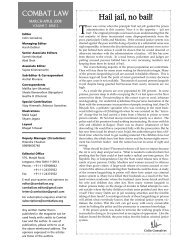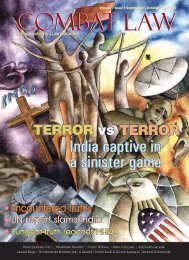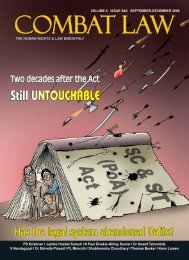“ The day will come whennations will be judged,not by their military oreconomic strength, norby the splendour of theircapital cities and public buildings,but by the well-being of their peoples:by their levels of health, nutritionand education; by their opportunitiesto earn a fair reward for theirlabours; by their ability to participatein the decisions that affect their lives;by the respect that is shown for theircivil and political liberties; by theprovision that is made for those whoare vulnerable and disadvantaged;and by the protection that is affordedto the growing minds and bodies oftheir children.” These words annuallyprefaced a special report that theUnited Nations Children’s Fundused to publish on ‘The Progress ofchild rightsKeeping a Watch on ChildRights in IndiaBY RAZIA ISMAIL ABBASIAMITA CHAVAN8 combat law • April - May 2004Nations.’ Ironically, the day has notyet come, but UNICEF has ceasedpublication of its yearly score-cardreport.Countries like ours should begrateful the report no longerappears, since India’s score wasalways below the line dividing positivefrom negative. It is a moot pointwhether its publication through the1990’s actually ever succeeded intweaking our national conscience.We regularly grumble about ourpoor ranking in the human developmentindex of the UNDP HumanDevelopment Report, and we feelgood when the World Bank or theBretton Woods Institutions pat us onthe back for cutting down on socialsector investments – but children’srights? Are we worried? Childrendie, suffer abuse, struggle throughchildhood without basic health care,nutrition, protection, learning opportunity– mostly without complaint,because they do not know how toprotest, or where. Who cares? Notthe Indian State. We seem not toanalyse what human developmentmeans.Was it always so? India’s Tara AliBaig – who campaigned long andhard for the human rights of children– often asked why this country’splanners and decision-makersalways placed children and theirneeds at the end of the line. As one ofthe architects of the UniversalDeclaration on the Rights of theChild, back in 1959, a long-timepresident of the International Unionfor Child Welfare, one-time head ofthe Indian Council for Child Welfare,and a tireless champion of the leastserved,least-reached, least-noticedchildren in our society and in theworld at large, she had a right to ask.In 1979, when the UN pushed theworld’s nations to observe theInternational Year of the Child, MrsBaig could take some pride in therole India had played in the UnitedNations’ dedication of a special yearfor children. Mr Krishna Menon, betterknown for his incisive diplomacyon other subjects, is on record in theGeneral Assembly’s annals for hiseloquent speech calling for the year.This advocacy by Indian NGOs andgovernment alike, gave India a specialplace as a pioneering voice forchildren’s right to be recognised andrespected. A decade after theInternational Year, Mrs Baig died inthe knowledge that the world communitywas moving towards a landmarkinternational legislation thatwould stand as a historic bill ofrights for children: the UNConvention on the Rights of theChild. Plans were also under way forthe UN to convene a World Summit
child rightsconference on children, the first eversuch event pledged to a particularage group. The VP Singh governmentdesignated Atal BehariVajpayee as its special envoy to theWorld Summit preparatory process.In keeping with its earlier advocacyfor world attention for children,India accepted the decisions of the1990 World Summit on Children,and in 1992 also acceded to the ChildRights Convention (CRC). On paper,it was making all the right moves.But in practice, it was doing nothingmuch to match the official signaturesit affixed to this and that internationalinstrument.On the one hand, the Governmentof India had always trotted out its1974 National Policy on Children asproof positive that national visionand commitment had preceded anythingthe UN had thought up. On theother hand, the Government had seldomif ever trotted out the list ofdevelopment defaults that stretchedbackwards from 1974 into thedecades past, or forward from thatyear into the 1980’s and 1990’s.Sadly, accession to the CRC didnothing to correct this bad habit.Implicit in becoming a State-Partyto the Convention is (a) the treatyobligation to implement it, with allthe reforms and revisions that thismight entail, and (b) the responsibilityto report performance to the UNCommittee on the Rights of theChild, and also (c) to make theConvention and country action“widely known.” India has managedthe feat of carrying out the second ofthese duties without paying dueattention to undertaking the first orthe third.It’s first country report, due in1995, was submitted in 1997. By thatstage in its evolution, the UN wasencouraging ‘shadow reporting’ byNGOs, and the Committee on theRights of the Child received eightNGO reports commenting on thatfirst phase of CRC implementation.Neither the official report, whichwas mostly an expression of goodintentions spliced together withdescriptions of schemes, and a fewunashamed remarks on some problems,nor the NGO reports attractedmuch public attention. TheGovernment took the prudent precautionof printing only 6,000 copiesof its report, 3,000 in English and3,000 in Hindi. This prudence effectivelylimited the chances of it beingread. Meanwhile, the status and conditionof children continued to bebad. Investment and social subsidycutbacks continued to make theirown negative inroads into children’sprospects and protections. The contradictionbetween kowtowing toStructural Adjustment standardsand meeting basic standards forchild survival and developmentseemed not to worry anyone verymuch.The seven countries of SAARC (theSouth Asian Association for RegionalCooperation) had taken the subjectof children on board as a summitissue in 1986, and few lines in theSAARC Summit declarations saidsomething about children. SAARCleaders also moved to take a collectivestand against child trafficking.After pledging a year to the girl childin 1990, SAARC dedicated the 1990’sdecade to girl children. India and theother six nations drew up actionplans. No report of action taken eversurfaced, beyond cursory updatesprovided to a 1996 review conference.Information, if collected, stayedon file somewhere. The 1997 SouthAsia Human Development Report ofPakistan’s Mahbub ul-Haq Centrehighlighted the shockingly bad situationof the region’s girl children. Thiswas the only assessment approximatinga shadow report.SAARC had brought together thecombined precautionary prudence ofseven governments into never publicisingwhat it had reported to itselfon the condition of its children. Thismay have served some bureaucraticpurpose, but it has not been fair to9 combat law • April - May 2004children. In recent years, some NGOinitiatives have examined theregional scene. But somehow, a‘shadow’ process of tracking the fortunesof South Asia’s children didnot develop to any visible degree ateither country or regional level. Afew notable Indians such as Mr RabiRay pressed for SAARC recognitionof the many kinds of trafficking,including the shameful camel jockeytrade to the Gulf countries. ButSAARC Summits have not beenfaced with peoples’ reports on childrights.Is there any regional linkage tochild rights efforts across the countriesof South Asia? All seven countriesare States-Parties to the ChildRights Convention, India havingbeen the last to accede. All havereported their performance to theUN Committee, not once but twice.Yet there is no visible evidence ofconcerted NGO advocacy or assessmenton common regional concernsbeing addressed to the UNCommittee, not even on the issuesthat SAARC has taken onto its agenda.Certainly, there is no regionalNGO report. The Mahbub ul-HaqCentre’s human development reportbrings regional concerns together,but do not reflect an ongoing NGOconsultative process. Over the pasttwo years, NGO think tanks andresearch bodies have made commoncause to formulate a ‘Citizens’ SocialCharter’ addressed to SAARC leadershipand the SAARC populace, butonly the India charter emerging fromthe country level of this process hasa sharp and conscious focus on children.This country charter seeks toset standards and priorities fornational policy and investment, butdoes not specifically link its proposalsto the Convention.One index of what is not happeningwas evident in the preparatory negotiationsfor the UN GeneralAssembly Special Session onChildren. In the run-up to theSpecial Session, only a handful of


